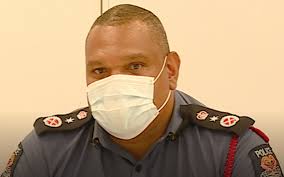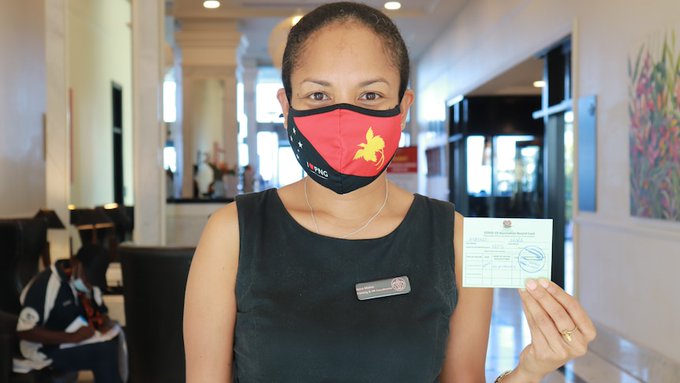Papua New Guinea has opened its vaccine programme to anyone over 18 years old as it tries to overcome high levels of hesitancy.
Health authorities are worried the country is particularly vulnerable to the Delta variant because of its low vaccination levels.
Papua New Guinea’s vaccination program is off to a slow start — so far just under 55,000 people have had a jab.
PNG had a worrying surge in cases from March to May and has faced logistical issues getting immunisation programs running across the country.
It’s also facing high levels of hesitancy, which authorities are largely blaming on misinformation and social media.
In a bid to encourage its workers to get vaccinated, the management of the Grand Papua Hotel in Port Moresby has been running ongoing education sessions.
They’ve also offered food vouchers worth 100 kina ($40) to staff who get the jab.
David Toua from Steamships Trading Company, which owns the Grand Papua, said the plan reflects “how important we feel vaccination is”.
“It is an added incentive and at the end of the day, what family doesn’t want 100 bucks of food on the table, so it’s something that’s for the good of the family,” he said.
“They get a bonus for doing the right thing, so everyone wins, I guess.”
Nora Maino works at the Grand Papua Hotel and has been vaccinated.
“My parents are living with me.”
So far almost 40 per cent of staff have opted in and Maino said more of her colleagues had just signed up to go in this week.
PNG is using AstraZeneca doses donated by Australia, New Zealand and the global COVAX facility for its rollout.
The Chinese government has also just supplied 200,000 doses of its Sinovac vaccine, but it is only being used for Chinese citizens in the country initially.
There are also growing concerns more than 70,000 donated vaccines may expire this month before they can be used.
There are plans to start mobile clinics, look at government-backed incentives, and potentially move stocks around the country to try to use them before they have to be destroyed.
“Hopefully with these strategies, fingers crossed, we should fully utilise these vaccines before the expiry date,” PNG’s COVID-19 incident manager Dr Daoni Essorom said.
Hospitalisation rates have fallen significantly in PNG in recent weeks and a temporary COVID-19 hospital opened in the capital during the surge has been closed for the time being.
PNG has officially recorded just over 17,000 cases and 173 deaths since the pandemic began.
But it is not clear exactly what is happening because of low testing rates and a limited ability to test samples in-country.
A drive-through testing clinic in Port Moresby run by St John Ambulance was completely empty when the ABC visited last week.
“In June, we only tested 26 people in 18 cars, so that’s about one or two a day, on the days that we open,” Jacquie Hennessy from St John PNG said.
“Compared to April, May, we were testing nearly a thousand a month — and now we’re down to 26.”
St John has reduced its opening times to two days a week because of the drop in demand.
“It’s incredibly concerning, with low vaccination rates and low testing, we really don’t have a picture of exactly what COVID is doing to PNG right now.”
The country’s ability to test samples for COVID-19 is about to get a big boost, thanks to a multi-million-dollar donation from an Australian foundation.
The Minderoo Foundation has sent a lab that can handle 3,000 tests a day.
“So that’s a very significant increase on what Papua New Guinea is able to do at the present time,” Steve Burnell from the Minderoo Foundation said.
The foundation’s chairman, mining magnate Andrew Forrest, visited PNG last year to look at possible hydroelectric projects in the country.
International arrivals to Papua New Guinea will now have to be fully vaccinated and will have to quarantine for 21 days on arrival.
The new measures come as the government tries to keep the Delta strain out of the country. So far, the government says there is no evidence of the Delta variant in PNG.
Health authorities had been considered banning all international flights, but they have stepped back from that move.
Rules have also been introduce that will allow fully vaccinated people to fly domestically unrestricted.
Unvaccinated people are only allow to fly for specific reasons including essential work, study, an emergency or to return home.
Police Commissioner and head of the country’s pandemic response, David Manning, said the tough new measures on international arrivals were necessary.

“Papua New Guinea has a real risk due to the high vaccine hesitancy which exposes the majority of our people to the virus and leaves us without a lot of options,” Manning said.
Manning repeated calls for citizens to be vaccinated.
He said being vaccinated will offer some level of protection from this highly contagious variant but people must still continue to wear face masks, maintain social distance, use hand sanitisers or wash hands regularly and avoid crowds.
SOURCE: ABC/PACNEWS














